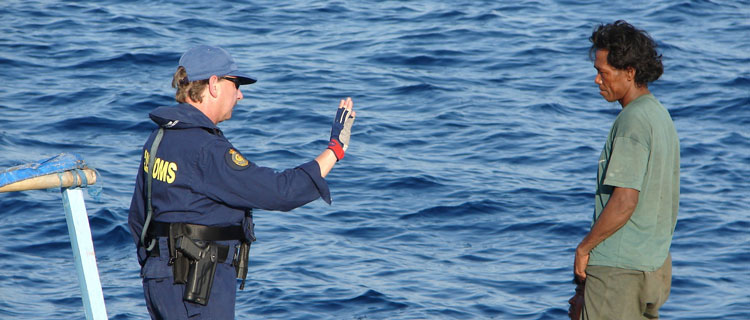
Illegal fishing
Catching up on fisheries crime
How Interpol and international networks join forces to stop illegal fishing
- Money involved in fisheries crime amounts to somewhere between $10 and $23.5 billion annuall
- Illegal fishing has become increasingly organised and sophisticated, but luckily so have the efforts to deal with it
- Article in Conservation Biology shows that the world’s biggest police organisation can provide an interesting alternative to less efficient governance
It is big business: the money involved in fisheries crime amounts to somewhere between $10 and $23.5 billion annually. There are thus clear incentives to engage in such activities. In fact, illegal fishing has become increasingly organised and sophisticated, but luckily so have the efforts to deal with it.
In an article recently published in Conservation Biology, centre researcher Henrik Österblom describes the international collaborative efforts to address fisheries crime. With a particular focus on the International Monitoring, Control and Surveillance (IMCS) network and INTERPOL, the world’s biggest police organisation, Österblom describes how they provide an interesting alternative to other, less efficient governance efforts.
"The surveillance of an increasingly sophisticated illegal fishing industry requires real-time access to information that regional management organisations have limited ability to share efficiently"
Henrik Österblom, author
A few good officers
As a response to these inefficiencies, a small number of compliance officers affiliated with established regional fisheries management organisations initiated an informal network in the 1990s to improve information flow among peers.
This network eventually developed into the IMCS network and some 20 years later it has grown to a formalised network of more than 50 member states. But despite its growth in size and significance, it had limited infrastructure for sharing an increasing amount of information. Enter INTERPOL. The world’s largest police organisation addresses crime through international cooperation and sharing of intelligence and in 2012 it established a permanent Fisheries Crime Working Group. That bodes well for continued fight against fisheries crime, according to Österblom.
"The different ways of collaborating and limited previous experience in working together may represent an initial challenge for IMCS and INTERPOL, but together they represent a promising example of the capacity of the international community to mobilise responses to global and complex challenges such as illegal fishing."
See animation describing how the illegal fisheries in the Antarctic has been reduced over the years:
citation
Österblom, H. 2014. Catching Up on Fisheries Crime. Conservation Biology. doi: 10.1111/cobi.12229
Henrik Österblom is a Deputy Science Director at the Stockholm Resilience Centre. His three primary research interests are 1) Social-ecological dynamics of the Baltic Sea, 2) International marine governance and 3) Seabirds and ecosystem change.






